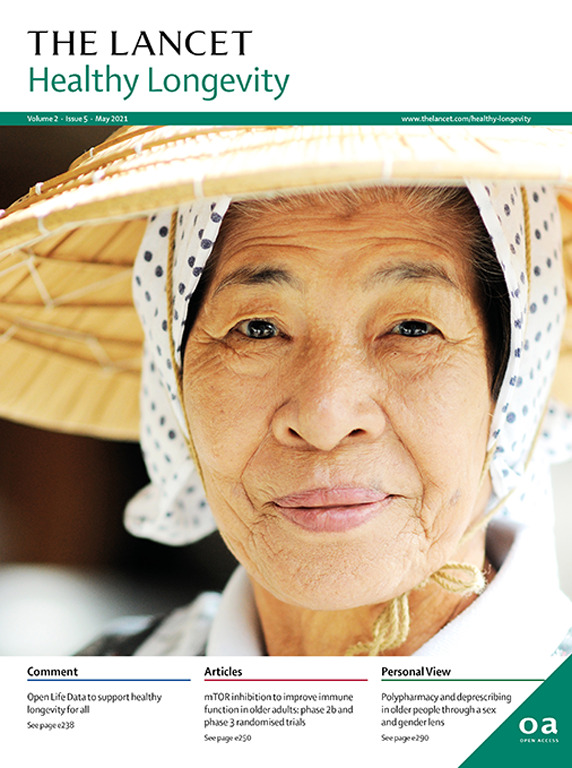Clinical and cost-effectiveness of a home-based health promotion intervention for older people with mild frailty in England: a multicentre, parallel-group, randomised controlled trial
IF 14.6
Q1 GERIATRICS & GERONTOLOGY
引用次数: 0
Abstract
Background
Health promotion for people with mild frailty has the potential to improve health outcomes, but such services are scarce in practice. We developed a personalised, home-based, behaviour change, health promotion intervention (HomeHealth) and assessed its clinical effectiveness and cost-effectiveness in maintaining independent functioning in activities of daily living in older adults with mild frailty.
Methods
This trial was an individual, multicentre, parallel-group, randomised controlled trial done in England. Participants were mainly recruited from general practices in three different areas of England (the London north Thames region, east and north Hertfordshire, and west Yorkshire). Participants were individuals residing in the community who were registered with a general practice, 65 years and older with mild frailty (scoring 5 on the CFS), with a life expectancy of more than 6 months, and with capacity to consent to participate. We excluded adults residing in nursing or care homes, those with moderate-to-severe frailty or with no frailty, those receiving palliative care, and those already case managed (eg, receiving a similar ongoing intervention from the voluntary sector or community service). Eligible participants were randomly assigned 1:1 to either the HomeHealth intervention or to treatment as usual. HomeHealth is a multidomain health promotion intervention delivered by the voluntary sector at home in six sessions over 6 months. The primary outcome was independent functioning (assessed using the modified Barthel Index [BI]) at 12 months. Outcome assessments were masked and were analysed by intention to treat using linear mixed models. Incremental costs and quality-adjusted life-years (QALYs) were calculated using seemingly unrelated regression and bootstrapping. The trial is registered on the ISRCTN registry (ISRCTN54268283).
Findings
We recruited 388 participants between Jan 8, 2021 and July 2, 2022 (mean age 81 years, SD 6·5; 249 (64%) of 388 were women and 139 (36%) were men). 195 participants were randomly assigned to HomeHealth and 193 to treatment as usual. Median follow-up was 363 days (IQR 356–370) in the HomeHealth group and 362 days (IQR 355–373) in the treatment-as-usual group. HomeHealth did not improve BI scores at 12 months (mean difference 0·250, 95% CI –0·932 to 1·432). HomeHealth was superior to treatment as usual with a negative point estimate for incremental costs (–£796; 95% CI –2016 to 424) and positive point estimate for incremental QALYs (0·009, –0·021 to 0·039). There were 55 serious adverse events in the HomeHealth group and 85 in the treatment-as-usual group; none were intervention related.
Interpretation
HomeHealth is a safe intervention with a high probability of cost-effectiveness, driven by a reduction in unplanned hospital admissions. HomeHealth should be considered as a health promotion intervention for older people with mild frailty.
Funding
National Institute for Health Research Health Technology Assessment.
英国轻度虚弱老年人家庭健康促进干预的临床和成本效益:一项多中心、平行组、随机对照试验
背景:促进轻度体弱者的健康有可能改善健康结果,但在实践中这种服务很少。我们开发了一种个性化的、以家庭为基础的、行为改变、健康促进干预(HomeHealth),并评估了其在维持轻度虚弱的老年人日常生活活动独立功能方面的临床效果和成本效益。方法本试验是在英国进行的一项个体、多中心、平行组、随机对照试验。参与者主要是从英格兰三个不同地区(伦敦泰晤士河北部地区,赫特福德郡东部和北部以及约克郡西部)的全科医生那里招募的。参与者是居住在社区的个人,他们在全科诊所注册,65岁及以上,轻度虚弱(CFS评分为5分),预期寿命超过6个月,并且有能力同意参与。我们排除了居住在疗养院或护理院的成年人,有中度至重度虚弱或没有虚弱的成年人,接受姑息治疗的成年人,以及已经进行病例管理的成年人(例如,接受志愿部门或社区服务类似的持续干预)。符合条件的参与者按1:1的比例随机分配到家庭健康干预组或常规治疗组。家庭保健是一项多领域的健康促进干预措施,由志愿部门在6个月内在家中开展6次会议。主要终点是12个月时的独立功能(使用改良的Barthel指数[BI]评估)。结果评估被掩盖,并使用线性混合模型通过意向治疗进行分析。增量成本和质量调整寿命年(QALYs)使用看似不相关的回归和自启动计算。该试验在ISRCTN注册中心注册(ISRCTN54268283)。研究结果:我们在2021年1月8日至2022年7月2日期间招募了388名参与者(平均年龄81岁,SD 6.5;388人中女性249人(64%),男性139人(36%)。195名参与者被随机分配到家庭健康组,193名参与者照常接受治疗。家庭健康组的中位随访时间为363天(IQR 356-370),常规治疗组的中位随访时间为362天(IQR 355-373)。HomeHealth在12个月时没有改善BI评分(平均差异为0.250,95% CI为- 0.932至1.432)。家庭健康优于常规治疗,增量成本的负积分估计(- 796英镑;95% CI -2016至424)和增量QALYs的正点估计(0.009,- 0.021至0.039)。家庭健康组有55例严重不良事件,常规治疗组有85例;没有一个与干预有关。家庭健康是一种安全的干预措施,具有很高的成本效益,减少了计划外的住院率。家庭保健应被视为一种促进轻度虚弱老年人健康的干预措施。资助国家卫生研究院卫生技术评估。
本文章由计算机程序翻译,如有差异,请以英文原文为准。
求助全文
约1分钟内获得全文
求助全文
来源期刊

Lancet Healthy Longevity
GERIATRICS & GERONTOLOGY-
CiteScore
16.30
自引率
2.30%
发文量
192
审稿时长
12 weeks
期刊介绍:
The Lancet Healthy Longevity, a gold open-access journal, focuses on clinically-relevant longevity and healthy aging research. It covers early-stage clinical research on aging mechanisms, epidemiological studies, and societal research on changing populations. The journal includes clinical trials across disciplines, particularly in gerontology and age-specific clinical guidelines. In line with the Lancet family tradition, it advocates for the rights of all to healthy lives, emphasizing original research likely to impact clinical practice or thinking. Clinical and policy reviews also contribute to shaping the discourse in this rapidly growing discipline.
 求助内容:
求助内容: 应助结果提醒方式:
应助结果提醒方式:


